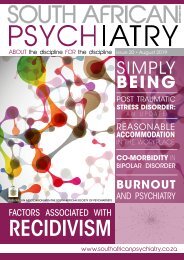South African Psychiatry - November 2018
South African Psychiatry - November 2018
South African Psychiatry - November 2018
Create successful ePaper yourself
Turn your PDF publications into a flip-book with our unique Google optimized e-Paper software.
PERSPECTIVE<br />
a yellow file, with next-of-kin details, and alternative<br />
contact numbers? I struggle to place my hurt and<br />
heartache into the category of another’s commodity.<br />
I STRUGGLE TO TRUST SOMEONE WHEN<br />
I FEEL THAT MY MOST INTIMATE DETAILS<br />
NEED TO BE HANDED OVER AS SIMPLY<br />
PART OF A ‘JOB’. IT MAKES ME FEEL<br />
DEFENSIVE AND GUARDED”<br />
I realize now that on day two or three of that<br />
admission my psychiatrist had tried to prepare me<br />
for the dreaded conversation he wanted to have<br />
with me the following day. He needed to know more<br />
detail about my story in order to treat me effectively,<br />
and he explained this to me – warning me that the<br />
next night we were going to ‘go there’. In some ways<br />
I felt pushed and I was angry, but more than anything<br />
else I was terrified. Today I know with certainty that<br />
my psychiatrist was acutely aware of my terror and<br />
that is why he had attempted to forewarn me about<br />
what was to come.<br />
REFLECTING BACK NOW I HAVE TO<br />
WONDER IF, IN A WAY, HE WAS PREPARING<br />
HIMSELF TOO. IT IS FAIRLY OBVIOUS HOW<br />
I FELT IN MY HOSPITAL BED DIATRIBE,<br />
BUT AT THAT STAGE I NEVER STOPPED<br />
TO CONSIDER HOW HE FELT. I KNOW IT<br />
WASN’T MY JOB OR DUTY – AFTER ALL I<br />
WAS THE PATIENT. BUT, I HAVE TO WONDER<br />
IF THIS TYPE OF SCENARIO ISN’T PERHAPS<br />
TOUGH FOR PSYCHIATRISTS TOO.<br />
How tough is it to be the one who has the responsibility<br />
to decide that a patient’s fear, instability and distress<br />
are so acute that the best place for them to be is the<br />
confines of a hospital bed?<br />
My psychiatrist has watched and listened to me as<br />
I’ve traversed every up and down along my journey.<br />
He has seen everything from pulsating nausea and<br />
shivers to insomnia and terror, elation, laughter,<br />
panic, dizziness, desperation, confusion, terror and<br />
migraines. He has witnessed it all. He has listened<br />
to my stories of bewilderment, love, dread, elation,<br />
travel, bikes, textbooks, graduations, mother, brother,<br />
friends, excitement and disappointment – so the list<br />
continues. I don’t know how he does it. When I leave<br />
my psychiatrist’s consulting room I often wonder how,<br />
day after day, he manages to listen, with such care<br />
to the complex and deep intricacies of so many<br />
people’s lives. Where does he find the reserves to<br />
perpetually assimilate the delicate nuances of every<br />
patient? Not all psychiatrists get this right, but what<br />
sustains those who do?<br />
I can’t imagine that being diagnosed with mental<br />
illness is great for anyone. It’s not something that<br />
comes coupled with a statement from your doctor of:<br />
“… but don’t worry we can cure this with a strong dose<br />
of penicillin”. I think about the fact that psychiatrists<br />
have a duty to regularly hand over diagnoses of<br />
these illnesses. Not only are they often incurable, but<br />
frequently they are tricky to treat – a tedious path<br />
of medication trial and error for both patient and<br />
doctor. In addition, these diagnoses psychiatrists<br />
pass over to us come loaded with societal stigma.<br />
Caring for us seems an overwhelmingly weighty<br />
responsibility. Does that weight ever feel too much<br />
to carry?<br />
Being on the receiving end of diagnoses and<br />
psychiatric treatment is far removed from Flake ice<br />
creams. I remember when I received my diagnosis;<br />
on the one hand I felt relieved – relieved that there<br />
was an explanation other than a lack of self-control<br />
for my erratic, unreasonable thinking and behaviour.<br />
BUT I ALSO FELT AS IF I HAD BEEN LEFT-<br />
HOOKED IN THE SOLAR PLEXUS. IN<br />
THOSE FIRST MOMENTS I DIDN’T FIND<br />
MYSELF DEALING WITH THE STIGMA OF<br />
THE OUTSIDE WORLD, BUT THAT, WHICH<br />
LIVED INSIDE MY OWN MIND. I HAD<br />
ALWAYS FELT A DEEP EMPATHY, OR<br />
PERHAPS SYMPATHY, TOWARDS THOSE<br />
WITH MENTAL ILLNESS. HOWEVER, IT WAS<br />
SOMETHING THAT BELONGED TO ‘THEM’<br />
NOT ME, SOMETHING WORTHY OF PITY.<br />
I was horrified at myself. After I faced myself I did<br />
have to deal with the reactions of the outside world.<br />
I find it so fascinating to watch the responses of many<br />
when I disclose my diagnosis. Even those who have<br />
known me for extended periods make comments<br />
such as: “No! But you’re so normal!” What pray-tell<br />
is that meant to mean? Do they expect me to be<br />
walking around wild-eyed and snarling? Or another<br />
choice reaction is when it seems as if the wind<br />
has been knocked out of them, and they scrabble<br />
desperately for a way to change the subject. If you<br />
let it, these reactions can make you believe that your<br />
‘abnormality’ renders you unworthy of consideration<br />
– renders you a failure on the most basic human<br />
level, shameful, and useless.<br />
Often, it has been the time spent sitting across from my<br />
psychiatrist that has helped me regain perspective<br />
and figure out how to navigate the hurdles of<br />
stigma. Amidst my own doubts and uncertainty my<br />
psychiatrist seemed to have consistent, granite belief<br />
in me – my abilities and potential, belief beyond<br />
what I could fathom. His belief fed my husband’s<br />
belief, and eventually this helped me believe that I<br />
shouldn’t give up, even when I fell. The combined,<br />
unwavering support I have received has often<br />
shored up my crumbling walls.<br />
I question how often it is that psychiatrists notice lifechanging<br />
moments that happen across from them.<br />
Moments that in their brevity might seem little, but in<br />
SOUTH AFRICAN PSYCHIATRY ISSUE 17 <strong>2018</strong> * 57

















